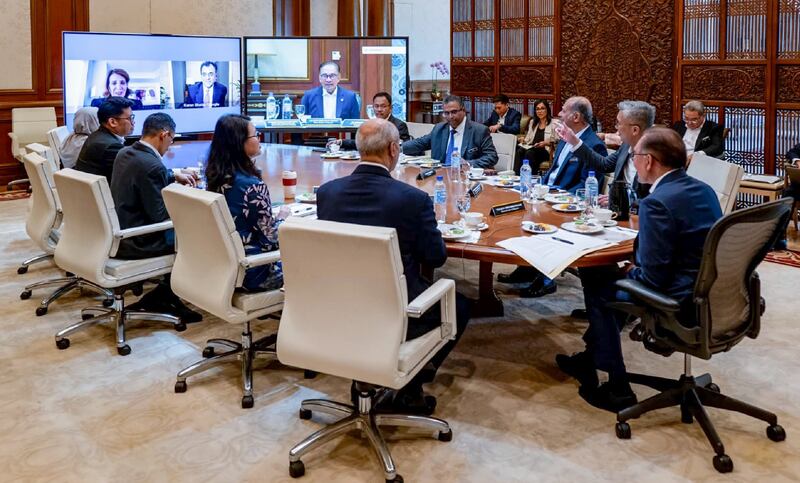Google will invest U.S. $2 billion (RM 9.4 billion) to build its first data center in Malaysia, the government and big-tech giant said Thursday, after Microsoft announced a similar spending plan earlier this month.
Google is the latest among Silicon Valley firms expanding in Southeast Asia to cater to growing demand and counter China's outsized influence in the region.
The company's investment, including in a Google Cloud region, is expected to create thousands of jobs in Malaysia by 2030. It comes on the heels of the Malaysian government allocating $5.3 billion (RM 24.9 billion) to make the country a global semiconductor hub.
“This [Google’s] investment is expected to have a twofold impact on Malaysia’s economy, of around $3.2 billion and the creation of as many as 26,500 jobs by 2030,” Prime Minister Anwar Ibrahim said in a statement after the announcement, adding that job opportunities would be created in the healthcare, education and finance sectors.
It “is evidence of the government’s clear planning, alongside the nation’s economic strength and resources, which attract both existing and new investors,” Anwar added.
Included in Google’s investment is AI (Artificial Intelligence) literacy programs for Malaysian students and employees.

The prime minister said he had cited the importance of the teaching component in his interactions with Google.
“In a virtual meeting with Google’s senior management May 6, I stressed that in addition to supporting the use of artificial intelligence (AI) in general, strategic collaboration needs to be concentrated in the fields of education, health and agriculture,” he said.
“This is important to ensure Malaysia can make use of the latest technology’s ongoing skills and approach.”
In November, Malaysia and Google signed a memorandum of understanding to create growth opportunities for Malaysians and local companies using AI and cloud technologies.
Google said the upcoming data center and cloud region is its largest planned investment in Malaysia.
"This investment builds on our partnership with the Government of Malaysia to advance its 'Cloud First Policy,' Ruth Porat, chief financial officer of Google's parent company Alphabet, said in a statement Thursday.
The data center will support digital services like Search, Maps, and Workspace, and the Malaysia cloud region will join 40 regions and 121 zones currently in operation around the world.
On May 2, Microsoft said it would invest $2.2 billion (RM10.3 billion) in Malaysia to take advantage of the rising regional demand for Cloud and AI. The company also announced investments in Indonesia and Thailand this year.
There has been a surge of interest in Southeast Asia, including Malaysia in recent months.
Apple Chief Executive Tim Cook, Microsoft Chairman and Chief Executive Satya Nadella, and Tesla founder Elon Musk recently visited countries in the region, including Malaysia.
After announcing the Google deal on Thursday, Anwar posted photos on social media of his meeting in Putrajaya with Richard Smith, president and CEO of FedEx.
The Malaysian PM said FedEx had informed him of their business expansion plans, especially at their facilities in several airports in the country. He didn’t provide details.
And on June 22, Apple will open its first retail store in Kuala Lumpur. Southeast Asia is becoming the beneficiary of technology firms' "China Plus One" strategy, where companies complement production in China with investment in other countries. Malaysia is among the nations where the semiconductor sector is getting a boost.
‘Widening FDI sources’
Investments like those of Google and Microsoft signal increased U.S.-China competition in Southeast Asia, analysts said.
In Malaysia in late 2023, the top five sources of foreign direct investment (FDI) were led by the Netherlands, followed by Singapore, the U.S., the People's Republic of China, and Japan, according to the Malaysian Investment Development Authority.
China recently fell behind in FDI in Malaysia although Beijing remains Kuala Lumpur’s top trading partner, said Geoffrey Williams, an economist with the Malaysia University of Science and Technology.
“The large investments from the U.S. in high-value technology areas is clearly positive. It reflects a widening of the sources of FDI which reduces the risk and dependence on one dominant source,” he said.
Malaysia has consistently said it wishes to remain friendly with both superpowers and neutral in its economic relationship.
Foreign affairs analyst Collins Chong Yew Keat said top U.S. firms investing in Malaysia signal strategic hedging and an eye on future changes in power dynamics in the region.
“China’s demographic outlook and long term prospects have also forced top firms to look elsewhere,” Collins from University Malaya, told BenarNews, referring to the country’s declining population and slowing growth.
“For this to succeed, it’s crucial to establish and maintain a strong regional base, which will help in resisting Chinese influence and ensuring the continuity of economic and trade partnerships in the region.”
